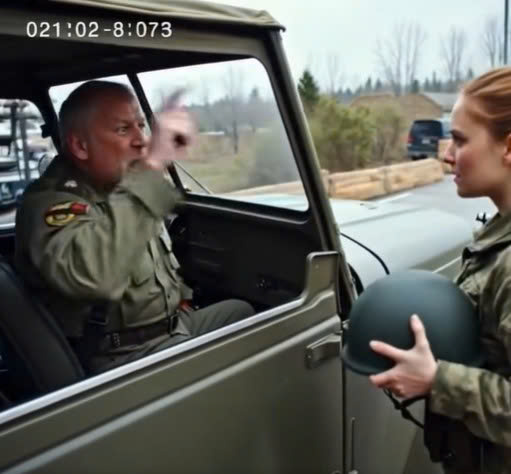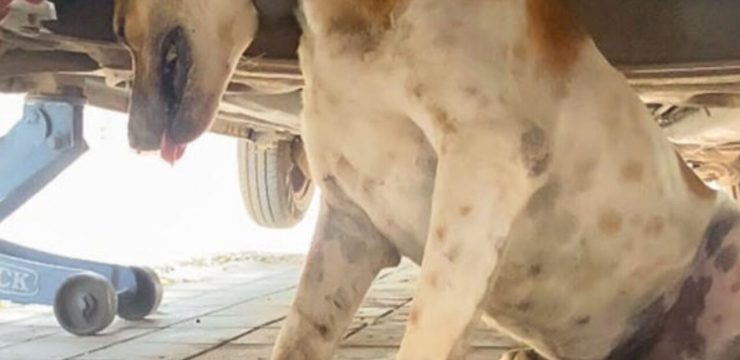The command cracked across the parade field like a sudden snap of thunder. “Why aren’t you saluting me?” Lieutenant Colonel Richard Brennan barked, his tone sharp enough to turn heads. He didn’t pause to ask who she was. He didn’t consider context. He simply saw a woman in civilian clothes and assumed she owed him automatic obedience. Major Sarah Thompson, who had spent more than fifteen years building a reputation for competence and calm leadership, stopped mid-stride. She turned toward him slowly and reached into her pocket. When she pulled out her identification and Strategic Command badge, sunlight glinted off the insignia that instantly revealed her authority. “It seems you haven’t read this week’s personnel updates,” she said evenly. “I’m Major Sarah Thompson, newly assigned to Fort Harrison as a strategic advisor. And for the record, Colonel, majors are not required to salute lieutenant colonels.” Soldiers nearby froze, stunned. Within hours, the moment would be repeated across the entire installation.

Sarah had grown up in military housing, raised in a family that understood service but never benefited from privilege. Her father worked as an Army mechanic; her mother cared for wounded service members as a nurse at Walter Reed. They moved every few years, living modestly and learning resilience with each relocation. Sarah, the only girl among five siblings, became tough early—running long distances, mastering weapons maintenance, and challenging the expectations others placed on her. When West Point turned her down because of a paperwork deadline, she refused to let disappointment derail her. She enlisted at eighteen, excelled in basic training, and deployed to Afghanistan at twenty as a combat engineer. She cleared dangerous areas, built operations sites, and earned the respect of seasoned soldiers who initially underestimated her. A respected platoon sergeant later urged her to pursue an officer’s commission because he saw potential she hadn’t fully recognized in herself.
She graduated near the top of Officer Candidate School, then spent the next decade establishing a reputation for strategic thinking, reliability, and fairness. She earned her master’s degree in strategic studies, published research used in training programs, and repeatedly accepted challenging assignments because she valued meaningful work over comfortable positions. After returning from a deployment in Syria, Strategic Command gave her a new assignment: evaluate Fort Harrison, a base struggling with morale issues, retention problems, and numerous complaints about its leadership—specifically complaints pointing toward Lieutenant Colonel Brennan.
Brennan had built his career during an era when loud voices were often mistaken for strong leadership. Over the years he developed a pattern of behavior that placed pressure on subordinates rather than supporting them. His comments toward female soldiers were rarely explicit but consistently dismissive, creating a culture where many felt overlooked or underestimated. Complaints had surfaced repeatedly, yet he managed to stay within the boundaries of formal regulations, preventing disciplinary action.
When Sarah arrived early to observe the installation quietly, her choice to wear civilian clothing inadvertently set the stage for their confrontation. Brennan spotted her walking across the parade ground and approached her with immediate irritation. “Do you have authorization to be here?” he demanded. When she calmly answered yes, his frustration grew. By the time he shouted, “Why aren’t you saluting me?” a crowd had gathered. Sarah allowed him to continue, knowing that how he behaved when he believed she was powerless would reveal what soldiers had described in their reports. Only when he insisted she show proper respect did she reveal her badge and identity. The entire field went silent.
Her arrival spread quickly throughout the base. For many, especially women who had felt discouraged and unheard, her presence brought a sense of hope. Staff Sergeant Maria Gonzalez approached Sarah later that day, expressing gratitude for what she had witnessed. Gonzalez described the challenges she and others had faced—working hard, meeting high standards, yet receiving limited opportunities for advancement. Sarah listened without judgment and asked thoughtful questions, gathering information to better understand the installation’s culture.
Over the following weeks, she met with soldiers across ranks, compiling their experiences into a comprehensive and factual assessment. Brennan, aware that his actions had been publicly witnessed, made an effort to alter his behavior. While many wondered whether his changes were genuine, Sarah remained professional and focused on measurable improvement rather than assumptions.
Her formal report to Strategic Command outlined clear patterns of inequitable treatment, leadership concerns, and morale challenges. She recommended leadership training for all officers, an accountability plan for Brennan, and systems to ensure fair evaluation practices. Her findings were accepted, and soon after, training began. During one session, Brennan openly reflected on how past experiences had shaped his leadership approach. It was the first visible indication that he might truly be willing to change.
Over the next two months, the atmosphere at Fort Harrison began to shift. Brennan made efforts to model better leadership—participating in physical training sessions, offering constructive feedback, and acknowledging when he made mistakes. Women received assignments that matched their qualifications. Soldiers noticed the difference, cautiously at first, then with growing confidence. The culture of fear began to fade, replaced by a more collaborative and respectful environment.
When a major readiness inspection arrived three months later, inspectors found a transformed installation. Soldiers openly shared that things had improved significantly since Sarah’s arrival. The inspection team noted Brennan’s progress but credited Sarah for identifying issues and guiding meaningful change.
By the end of her assignment, reports of unequal treatment had fallen to zero, retention improved, and morale rose sharply. On her final day, Brennan held a formation to publicly acknowledge her influence. He thanked her for demonstrating what leadership should look like and for reminding the entire installation that respect and professionalism are fundamental values, not optional ones.
As she prepared for her next assignment at Fort Bragg, Sarah reflected on how far she had come—from a young enlisted soldier determined to prove herself to a respected leader trusted with repairing broken systems. She knew the work ahead would be challenging, but she also knew the strength she carried. Her promotion to lieutenant colonel arrived shortly after, a recognition of her integrity, consistency, and ability to inspire change.
Driving away from Fort Harrison, she understood something clearly: real leadership isn’t about rank or volume. It is about character, competence, and the courage to stand firm even when assumptions cloud the truth. That day on the parade ground, her badge had reflected the sun—but her confidence had reflected everything she had earned. And she was far from finished.





